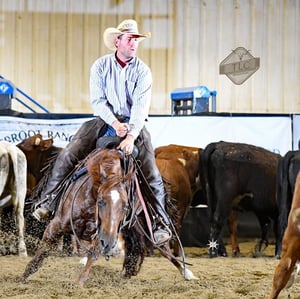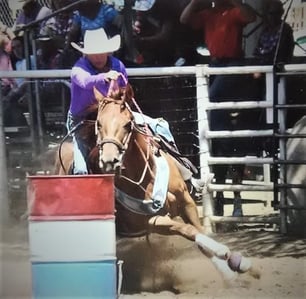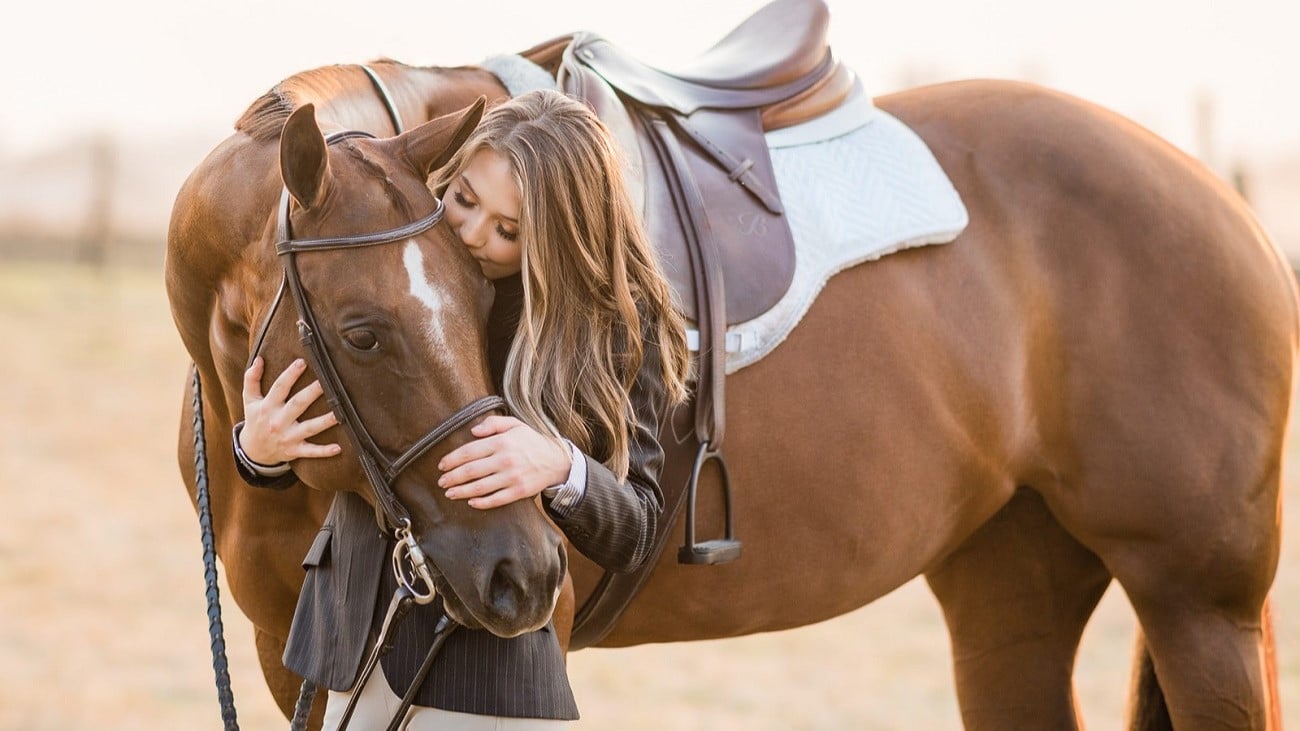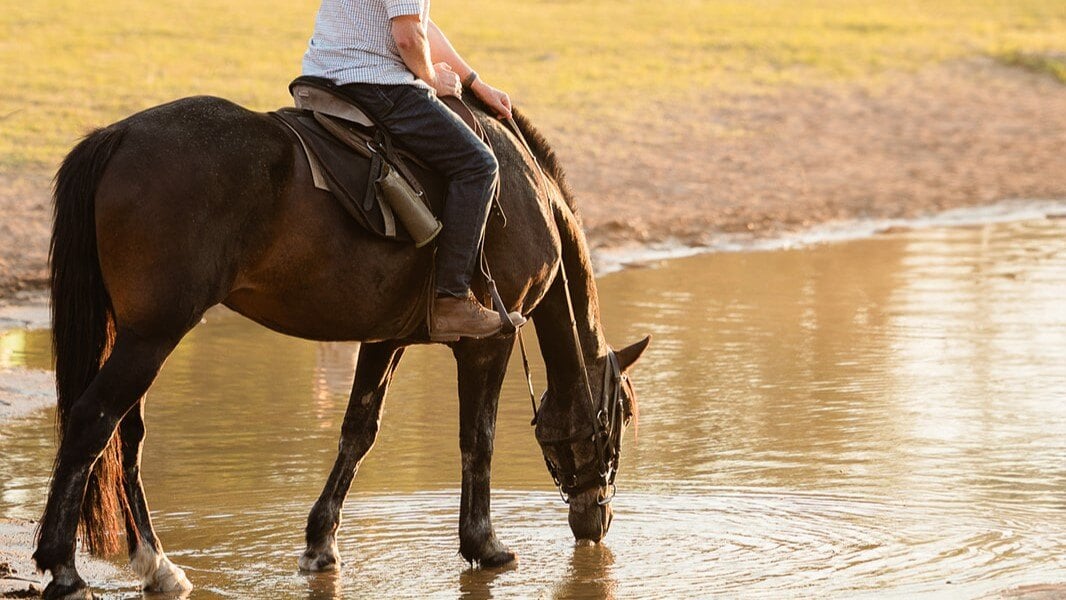Why Horses Get Stressed (& What to Do About It)
August 17, 2022
Why Horses Get Stressed (& What to Do About It)
Is your show horse showing signs of stress? Anxious to help but not sure how? Horses in all disciplines get stressed, which decreases equine performance and output. It also creates worry for owners. Because as you know, no matter how talented your horse, if they are stressed, you can’t connect and perform your best together.
Here’s the good news: there are simple yet effective ways to ease worries and increase horse wellbeing. We asked two professionals to share advice on how they help competition horses stress less and stay performance ready. Their tips are below. First, though, let’s cover why horses get stressed and how to recognize the signs.
Quick Content Guide
- Six reasons your horse may be stressed
- Signs and symptoms of a stressed horse
- Pro tips from Westin Sampson: Recommendations on feeding, hydration, and traveling
- Pro tips from Natasha Zunck: Ideas to reduce horse stress by becoming a better rider
- Natural performance horse supplements by Redmond Equine
6 Common Causes of Stress in Horses
Horses experience anxiety for many reasons. However, performance horses in particular face unique challenges their pasture pals don’t. While this isn’t a comprehensive list, these six stressors are often the culprits behind competition horses feeling uptight.
- New environment. Horses are emotional animals easily affected by their environment. We toss show horses into all sorts of stressful situations with bright lights, loud noises, unfamiliar surroundings, and crowds of people and strange horses.
- Disrupted schedule. When we pluck horses from their home and introduce them to the show world, we remove the stability of a familiar environment, routine, and eating schedule. Because horses are prey animals, their first primal instincts in a new situation are, how do I keep myself safe, how do I eat, and where do I get my water?
- Increased workload. It’s a given we work performance horses harder than hobby horses and pasture pets. As a result, many equine athletes struggle under the workload and pressure.
- Frequent trailering. Travel taxes a horse on multiple levels. Long trailer rides can impact a horse both physically and emotionally. Many go off of water, feed, or experience bouts of diarrhea.
- Gut problems. Did you know equine behavior is affected by what goes on in the gut? Stress causes gut issues, and gut issues cause stress. If your horse seems strained, you should rule out the possibility of gastric ulcers or other digestive problems.
- Stressed rider. Do you get tense and on edge before competing? Your horse is also fine-tuned to your emotions, and when you’re nervous, they get nervous. We’ve got tips on how to improve that below. But first…

Visual Signs of Stress in Horses
How do you know if your horse is truly stressed or just having an off day? Horses have unique personalities and manifest anxiety differently. The best way to detect acute stress is to know your horse well enough to pick up on changes in body language and temperament. However, below are common signs to watch for that may help tell if a horse is stressed:
- Profuse sweating without working hard.
- Reduced appetite or going off feed.
- Refusing to drink, especially while traveling.
- Frequent episodes of diarrhea or loose manure.
- Weaving, pacing, pawing, cribbing, or circling the stall.
- Rearing, bolting, or acting out in the arena.
- Aggression at the trailer.
- Changes in normal disposition.
- General lack of energy or interest.
10 Pro Tips on How to Calm a Stressed Horse
Many horses’ worries are reduced by simply adjusting what we do as horse owners. Let’s get tips from our experts on how to help a stressed horse.
Tips from Westin Sampson — Advice on Feeding, Hydrating and Traveling
 Westin is the head trainer for Double Down Horse Ranch. He professionally shows and trains cutting horses, and keeps around 30 in training that show at major and local events across the western U.S. Westin has proven his abilities in the NCHA World Finals and dozens of other events nationally. He understands success is solely dependent on his horses and how well they're feeling.
Westin is the head trainer for Double Down Horse Ranch. He professionally shows and trains cutting horses, and keeps around 30 in training that show at major and local events across the western U.S. Westin has proven his abilities in the NCHA World Finals and dozens of other events nationally. He understands success is solely dependent on his horses and how well they're feeling.
“You can be the best trainer in the world," he said, "but if your horse isn't feeling healthy when it’s time to compete, the training isn’t going to do any good.”
Westin has a wealth of experience keeping equine athletes comfortable in high-stress environments so they're ready for the moment when preparation meets opportunity and can capitalize for the win. Below are his recommendations for destressing show horses.
#1. Stick to a consistent feeding schedule
Horses are creatures of habit, and the second we take them out of their normal schedule, they’re on edge. If you’re ten minutes late to feed, they know it and are already stressing and thinking, ‘Oh, my gosh, we’re not getting food today.’
A big thing I do at home is feed my horses at exactly 6 in the morning and 6 at night. Our horses know exactly when we’re coming and don’t worry. Whatever time you feed, stick to that time, and do it every day. Keep that schedule on the road as well so horses can be comfortable on the same feeding schedule.
#2. Keep food in front of horses to reduce stress when traveling and at Home
Horses are grazing animals and should have access to some forage all day to keep saliva production going and help balance pH levels in their stomach. Eating small amounts all day is better for their gut and helps prevent impaction and ulcers.
Our horses pretty much eat all day long. At home we feed free-choice hay. When we’re on the road I like using hay nets because I can track which horses are eating, and how much. It also gives them something to nibble on while they’re in the trailer or stall, which keeps them from worrying.
#3. Considering feeding a high-protein, high-fat diet
My clients all want to see fat, healthy, happy horses that also work hard and perform well. Reaching that balance is a battle we fight in the performance world. It’s a battle we easily win, though, just by giving horses quality feed and making sure water intake is good. Our horses are all extremely healthy and trim, and we only feed high-quality alfalfa, a pound of high-fat, high-protein feed for energy, and two ounces of omega coconut oil.
#4. Treat and prevent ulcers in horses
The number of horses with ulcers is so high, we just assume every horse has them. My advice is to make sure your horse is on some sort of ulcer supplement. At Double Down, we use Daily Gold for daily gut support in our horses and the Daily Gold Syringe paste before trailering or other stressful situations. It keeps the ulcers down and heads off a lot of problems before they begin.
#5. Keep horses hydrated at home and on the road
Hydration is key to reducing stress—and it’s the cheapest thing we can fix. I’m a big believer that the more horses drink, the better they feel, the fewer problems they have, and the better they perform.
Often horses don’t want to drink on the road because they’re uncomfortable in their environment and can’t relax. Then when you get to your destination, they’re all sucked up and it takes two days to recover. It’s easier to prevent dehydration than to get a horse healthy after he's already dehydrated. I do these things to combat horses getting dehydrated and stressed when traveling:
- Give all my horses IsoBalance Electrolyte paste two days before so they start the trip hydrated.
- Tie a Redmond Rock on a Rope in their stalls and trailer to lick and encourage drinking.
- Keep fresh water in front of horses and dump buckets when they get dirty.
- Hit horses again with Redmond Electrolyte paste every three days if I’m in an area with heat and humidity.
- Give another Redmond Electrolyte paste the night before they perform.
My horses stay hydrated, they feel good, and it shows in the way they look and in the show pen.
Tips from Natasha Zunck — How Riders Can Reduce Horse Stress
 Natasha is an instructor and events coordinator with legendary barrel racer Connie Combs. Together, they host clinics and help riders become better through their No Excuses clinics. Natasha has dabbled in nearly every discipline, but professionally spends her time teaching the finer points of barrel racing and giving riders tools to improve themselves. Her tips on decreasing horse stress by developing the human-horse relationship are below.
Natasha is an instructor and events coordinator with legendary barrel racer Connie Combs. Together, they host clinics and help riders become better through their No Excuses clinics. Natasha has dabbled in nearly every discipline, but professionally spends her time teaching the finer points of barrel racing and giving riders tools to improve themselves. Her tips on decreasing horse stress by developing the human-horse relationship are below.
#1. Improve your horsemanship
These days so many people want to just get on a horse and start riding or running barrels and don’t think about a strategic way to do it. They’re jerking around their horse’s face, laying on them all the time, and that creates pain and anxiety for the horse. That stress keeps building, they’re in more pain, and then the horses start running from the pain.
A great way to improve horsemanship is to take riding lessons from a professional to improve your skills, your horse's skills, learn something new or even tune up old skills! Professionals also offer so much online with articles, training videos and books.
#2. Attend a clinic and keep learning
I applaud riders for attending clinics because they’re making themselves better. Continuing to learn and develop as a rider is the best thing you can do for your horse. You don’t know everything. I don’t know everything. Connie Combs is a legend in barrel racing, and she’ll tell you she doesn’t know everything. My biggest recommendation is to continue to learn and improve for your horse.
#3. Increase your confidence as a rider
Riders often lack confidence because you can’t control your horse 100 percent of the time and you don’t always know what’s going to happen. But horses need leaders. And when the rider lacks confidence, the horse lacks confidence and they’re anxious all the time; then the ulcers and other problems start.
As you build your confidence as a rider, your horse will slowly build trust in you, and that reduces stress. There are some great book options out there—like Heart of a Champion, by Donene Taylor—to help you work on your mental health and leadership as a rider.
#4. Be mindful of how much you're riding
Some horses are only run on the weekends and then sit in a stall all week. Horses need to be ridden to develop the stamina, muscles, and lung capacity to do what we ask of them. They need to be physically fit. Get your horse out of the stall every day and ride it at least a couple of days a week.
On the other hand, some people spend hours upon hours riding their horses. They get worked hard, sometimes it’s too much to handle and the horse gets burned out. Look at your horse’s workload, see if they’re being overworked, and consider lightening the amount of time you ride.
#5. Spend downtime with your horse
Riders often get super intense when they load up and go to events, and all their horse knows is their rider is intense all the time.
It’s important to develop a relationship with your horse and spend quiet time outside of training and competing. Groom your horse. Go outside one evening and bathe it. But definitely spend time together—not just in the saddle, but on the ground. When you’re at peace around your horse, it will have peace of mind and realize life isn’t always stressful.”
Provide Stress Relief for Horses with Redmond Supplements
Stress doesn't have to limit your ability to connect, compete, and enjoy life with your horse. All-natural Redmond products help restore health and naturally reduce stress. Watch the two-minute video above to see why performance horse trainer Shelby Waggoner uses Redmond supplements to help her horses stay calm and healthy. Then check out the products she uses below!
- Daily Gold: Supports optimal daily gut function, buffers acid, soothes ulcers, and relieves diarrhea.
- Daily Gold Syringe: Quickly buffers acid and soothes acute digestive discomfort, helping horses feel calmer.
- Rock on a Rope: Mineral rock salt with 60+ trace minerals to encourage hydration and health. Ties anywhere!
- Daily Red: Loose mineral salts formulated to meet the demands of hard-working horses.
- IsoBalance: Isotonic electrolyte paste matches horse sweat to replace what's lost, triggers hydration, and assists with recovery.
Try a Redmond product today! Naturally decrease your horse's stress levels so you can better connect and perform your best.
Learn More
- Does your horse suffer from performance anxiety? Read why Emma chose the Daily Gold Syringe to help calm her horse before competing.
- Seasoning a new performance horse is taxing for both the horse and rider. Learn how Daily Gold helped Kyra and her horse relax.
© Redmond Equine 2022. All rights reserved.
Related posts

Redmond Daily Duo: Foundational Horse Mineral Supplements
Choosing the right minerals for your horse is vital. Redmond keeps it simple with two core mineral supplements that support horse gut health and...
December 18, 2024

How to Hydrate a Horse | Tips from Julie Goodnight
Some horses just won't drink enough water. So, how do you keep a finicky horse hydrated? EducatorJulie Goodnight provides helpful tips on horse...



